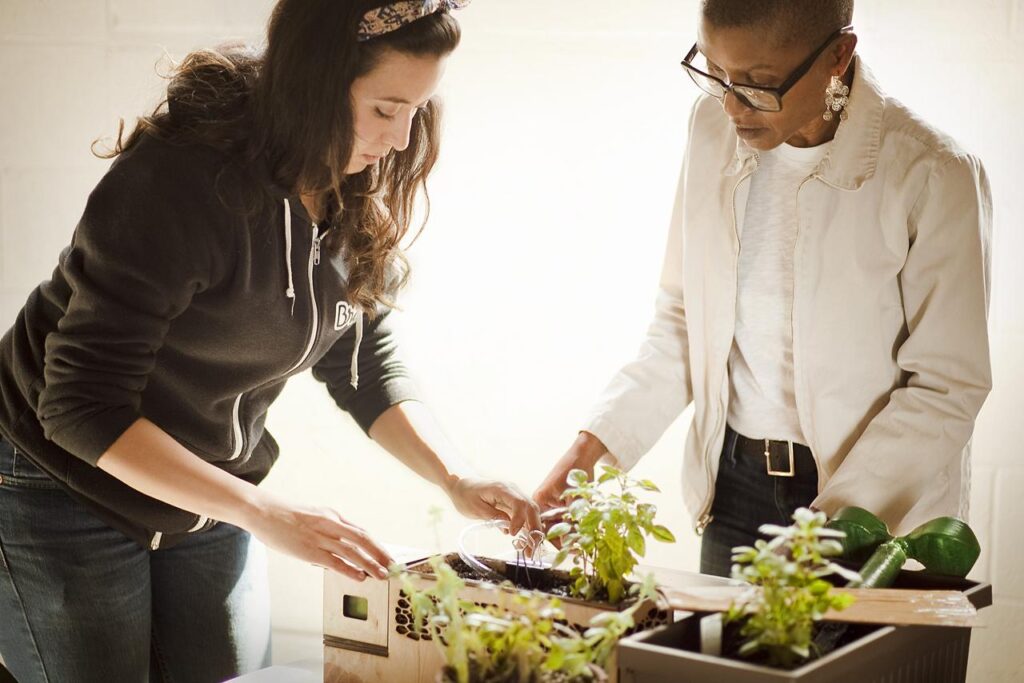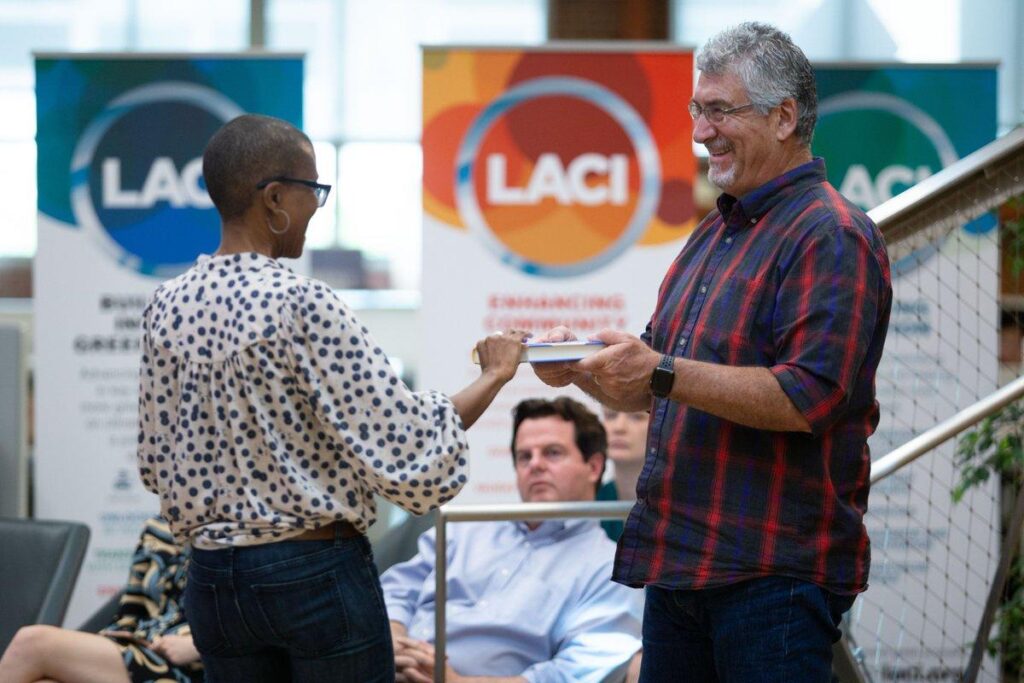DataDay Design is interviewing CEOs and Founders of start-ups and early-stage companies to chat about entrepreneurship and learn how these businesses are navigating the COVID-19 pandemic. This interview is with Sabrina Williams, co-founder, and CEO of SEED, a Bluetooth-operated automatic irrigation system that both gives farmers the ability to control water distribution for outdoor farming and provides people the power to grow food from the comfort of their kitchen.
You can read more of our interviews with America’s brightest entrepreneurs here.
What is SEED?
SEED, or Sustainable Entrepreneurial Ecosystem Development, is a Bluetooth-operated automatic irrigation system that uses precision moisture sensors to allow people to combat one of the major challenges of growing food: watering. There are two ways to use the system. Indoors to grow herbs in the company’s Seedbox, or the individual sensors can be placed outside and controlled via smartphone to manage watering on larger plots of land.
Traditionally, water distribution is dictated by historical data or a simple timer. The Bluetooth-controlled sensors, however, distribute water based on soil needs, determined by the moisture sensors. As such, plants are watered to their exact specifications, including local environment and soil conditions.

How Did SEED Start?
SEED grew out of a non-profit organization that Sabrina ran for twenty years which helped people from low-income backgrounds grow their own food. There she developed the automatic irrigation system to help farmers engender more productive yields. Towards the end of her non-profit work, Sabrina and her travel partner, SEED co-founder Ruby Rios, traveled to Cuba to introduce the irrigation system to local farmers.
The farmers there combined organic and regenerative farming processes with the automatic irrigation system to increase their yields three-fold. Sabrina and Ruby incorporated these changes and branched out to start SEED.
Does SEED Participate in CSR?
SEED is incorporated as a benefit corporation to confirm its commitment to sustainability and agricultural technologies that support food security. It is part of the company’s mandate to provide its systems to small-hold farmers globally. Accordingly, for every SEED kit sold, one is given to a farmer around the world to help improve food security.

How Has COVID-19 Affected SEED’s Approach to Growth?
At the beginning of the pandemic, SEED was working at the prototyping center of the Los Angeles Cleantech Incubator (LACI). The company had created and installed its MVP in the field for testing. The testing process was going well until March hit and put a halt to the company’s plan. SEED had a month’s worth of data but was hoping to gather data over a four-month period.
Sabrina and Ruby realized, with the large model on hold, farmers were craning for the smaller version. They’d used it in Cuba and in South Los Angeles, so switching models was an easy pivot. SEED quickly partnered with the Los Angeles Community Garden Council to provide a portion of proceeds to underserved farmers. According to Sabrina, when SEED offered the “starter kits” online, they immediately started selling.
The success was a bittersweet feeling though. The smaller kits were popular, but the larger model, which they’d poured time and energy into was indefinitely paused.
What was SEED’s Experience as a Part of LACI?
SEED was working out of LACI’s advanced prototyping center when the company learned about the local incubator’s Founder’s Business Accelerator. They applied for the program and were accepted; the company’s development was quickly catalyzed, in part by some of the fantastic mentors there.
After its experience in the accelerator, SEED applied for and was accepted to LACI’s two-year incubator program. Joining the incubator helped SEED to narrow down its business strategy and to procure helpful resources to develop the company. For example, many startups don’t have the cash outlay for legal help, but SEED had access to LACI’s legal services.

How Has SEED Approached Fundraising?
As a hardware company, a lot of early work must prove consumer traction. In the beginning, the company struggled with fundraising without having an actual product in-market. However, with the launch of SEED’s starter kits, that has now changed, allowing the company to better illustrate consumer interest.
Still, instead of pursuing VC firms and cash-rich grant competitions, SEED has focused on smaller pilot programs and pitch competitions. SEED seeks to prove its value while continuing to practice and hone its investment pitch.
Climate Change Has Accelerated a Trend Towards Small-Hold Farming; How Has That Contributed to SEED’s Development?
It is a primary piece of the company story. Agriculture utilizes a large portion of the world’s resources and has a heavy impact on climate change, whether via water consumption, carbon and methane release, or other forms of pollution. With an efficient system like SEED, farmers not only save water but also have an opportunity to learn practices that enable them to capture more carbon.
In keeping with the trend towards small-hold farming, SEED is dedicating resources to education. Specifically, the company is educating farmers on how to be more regenerative in their farming practices with the SEED system.
Currently, the company is also developing a sensor to include in its larger SEED system that will allow small-hold farmers to measure their carbon output. Small-hold farmer’s supply about 70% of the world’s food, but often lack the tracking tools and resources that large-hold farms have. That’s why SEED is developing the carbon sensor to help farmer’s measure their output and subsequently, reduce their carbon footprint so that they can enter into carbon marketplaces.

How Does SEED Approach Digital Strategy and Branding?
SEED’s Chief Operating Officer, Ruby Rios, has a strong background in digital strategy as a former web developer and marketing consultant to non-profit organizations. With her guidance, the company has utilized multiple channels to develop its brand essence, especially email marketing and social media content production. In addition, SEED also runs PPC campaigns and delivers a monthly newsletter.
It is a lot for just two people to manage, but thankfully, once again, LACI has proven its worth. The incubator has helped SEED to develop a content strategy which has streamlined its marketing efforts, making it easier for two people to manage.
Is SEED’s Focus Domestic or Global?
Because of the pandemic, SEED is primarily focused on domestic consumers. However, the company has partners in multiple foreign countries, including Cuba, Mexico, and Kenya. Those partners are waiting for SEED systems to be delivered. If not for COVID-19, the business would already be in these markets and expanding further globally.
Where Do You See SEED in 2-3 Years?
For the smaller system- in every gardener in America’s hands (42 million to be exact). In addition, Sabrina hopes the larger systems will be implemented in those countries of SEED’s global network.
The goal is to work with international organizations like USAID to help solve the global food crisis so that the world can feed 10 billion people by 2050.
To read more of our interviews with America’s brightest entrepreneurs click here.




